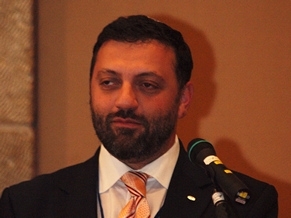|
Euroasian Jewish News

EAJC Deputy Secretary General Haim Ben Yakov
|
EAJC General Council Chairman Speaks at Hearings Opposing Anti-Semitism
12.11.2013 On November 11, 2013, hearings titled “Jewish Communities Counteracting Anti-Semitism and the Delegitimization of Israel” were held in the Knesset by the Immigration, Absorption and Diaspora Committee. During the hearings, Euro-Asian Jewish Congress Deputy Secretary General Haim Ben Yakov read the yearly anti-Semitism report and a special report on the Ukrainian “Svoboda” party, both prepared by the EAJC analyst group.
When comparing Russia and Ukraine to leading Western countries, it can be said that the two post-Soviet countries are “bastions of relative peace.” In 2011, there were over 60 recorded cases of physical violence on an anti-Semitic basis; and in 2012 - 177 cases of violence and vandalism. In Great Britain there were 92 recorded cases of attacks and 63 acts of vandalism; in 2012 - 69 violent assaults and 53 cases of damage to and desecration of Jewish property. In Russia, over the entire period of 2011-2012, there were 5 recorded attacks, one insult, and 38 cases of anti-Semitic vandalism.
This situation in post-Soviet territory is the consequence of several factors. First of all, Jews have en masse emigrated from these countries, and thus have practically vanished from most people’s view. Additionally, most Russian xenophobes found a new chief enemy in “the migrant” — someone who emigrated from the Caucasus or from Central Asia. An encroaching phobia of Islam drew interest towards Israel, seen as opposing aggressive Islamism. This interest and sympathy stopped “new anti-Semitism” from any significant development.” At the same time, since the early 2000s Russian and Ukrainian authorities have practically taken an official course towards cooperation with Israel, which left “anti-Zionism” with no support from the countries’ leadership.
But this does not mean that anti-Semitism has completely disappeared in Russia and Ukraine. It exists in its “classic” form and as a latent affliction. For example, no less than 8% of Russians are certain that Jews are among Russia’s chief enemies.
Other speakers at the hearings included a deputy of the French Parliament, leaders of Jewish communities of Belgium, Canada, and Australia, leaders of Jewish federations of Chicago and Los Angeles. A video conference also took place with a representative of the Jewish National Fund, who had been attacked physically in Australia and had been in serious danger.
|
|
